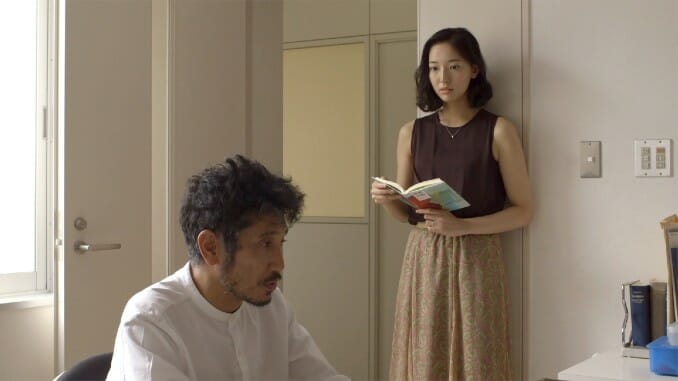Wheel of Fortune and Fantasy Spins in Strange Splendor

The awkward charm of coincidental encounters is what sets Ryusuke Hamaguchi’s Wheel of Fortune and Fantasy in motion, a collection of three short films about the unexpected outcomes of otherwise mundane interactions. Each segment lasts approximately 40 minutes, focusing on full-length casual conversations and the intense emotions they immediately provoke. The film’s anthology approach works as a compelling contrast to Hamaguchi’s other 2021 feature, Japan’s Oscar selection Drive My Car, which itself is a three-hour adaptation of Haruki Murakami’s short story of the same name. Whether by weaving together standalone shorts or fleshing out an existing text, the director suggests that the subtleties of everyday exchanges often harbor strange secrets.
The first of the three segments, entitled Magic (or Something Less Assuring), begins with two best friends chatting as they split a car home after a professional photoshoot. Their dialogue is playful yet earnest, chiefly revolving around producer Tsugumi’s (Hyunri) latest fling. She begins to describe the intense connection between herself and her prospective beau to model Meiko (Kotone Furukawa)—including how the man has already given her the pet name Tsu. She listens intently to her friend, giggling and grinning the whole ride as she divulges more details. However, Meiko begins to recognize something about the man that Tsugumi outlines. After the car drops her friend off, Meiko politely asks the driver to turn around. In changing her final destination, she resolves to confront the man who she believes Tsugumi has become enamored with. Though Meiko’s jealousy and pride seem to inform the majority of the interaction that follows, she is nevertheless wracked with guilt: Is she engaging with this man in order to protect her friend, or to sabotage her?
The next chapter, Door Wide Open, follows bored housewife Nao (Katsuki Mori) as she navigates her pursuit for higher education. Despite having a husband and young daughter at home, Nao spends her time between courses sleeping with fellow classmate Sasaki (Shouma Kai)—though the affair lacks chemistry or any semblance of emotional investment. While Nao feels out of place among her considerably younger colleagues, Sasaki is alienated due to his strong hostility toward his former professor Segawa (Kiyohiko Shibukawa), who failed Sasaki last term. When Segawa becomes the focus of a media frenzy in the wake of his recent award-winning novel, Sasaki convinces Nao to seduce him in an attempt to tarnish his reputation. Nao reluctantly agrees, but finds executing the honeytrap to be difficult due to her genuine appreciation for Segawa’s work. She reads a highly explicit passage from the professor’s novel during his public office hours, with Segawa insisting that the door remain open at all times (even when reciting scenes involving testicle teasing). Erotic tension and technological backfires play off one another to craft a story that is engrossing and unbearable at once, with the characters’ individual reckless cockiness all but inviting an unfortunate unraveling.
Rounding out the three tales is Once Again, which features a peculiar sci-fi slant: After the computer virus Xeron causes a permanent end to the age of technology, a young IT systems engineer (Fusako Urabe) becomes unemployed as a result. On a whim, she leaves Tokyo and travels to her hometown for a high school reunion, where she hopes to reconnect with a classmate who is now unreachable in a newfound analog age. Coincidentally, a chance encounter at the train station manifests her old friend’s (Aoba Kawai) presence, with the two resolving to reconnect over tea and sweet bean paste. Eager to be speaking with one another, the two women nonetheless uncover startling revelations about the other—chiefly concerning their identities, memories and misconceptions. Neither woman gets what they expect over the impromptu meeting, but what they gain brings them closer to understanding their own motivations and desires.
-

-

-

-

-

-

-

-

-

-

-

-

-

-

-

-

-

-

-

-

-

-

-

-

-

-

-

-

-

-

-

-

-

-

-

-

-

-

-

-








































